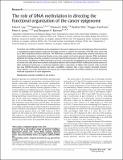The role of DNA methylation in directing the functional organization of the cancer epigenome
Author(s)
Lay, Fides D.; Liu, Yaping; Kelly, Theresa K.; Witt, Heather; Farnham, Peggy J.; Jones, Peter A.; Berman, Benjamin P.; ... Show more Show less
DownloadLay-2015-The role of DNA meth.pdf (1.767Mb)
PUBLISHER_CC
Publisher with Creative Commons License
Creative Commons Attribution
Terms of use
Metadata
Show full item recordAbstract
The holistic role of DNA methylation in the organization of the cancer epigenome is not well understood. Here we perform a comprehensive, high-resolution analysis of chromatin structure to compare the landscapes of HCT116 colon cancer cells and a DNA methylation-deficient derivative. The NOMe-seq accessibility assay unexpectedly revealed symmetrical and transcription-independent nucleosomal phasing across active, poised, and inactive genomic elements. DNA methylation abolished this phasing primarily at enhancers and CpG island (CGI) promoters, with little effect on insulators and non-CGI promoters. Abolishment of DNA methylation led to the context-specific reestablishment of the poised and active states of normal colon cells, which were marked in methylation-deficient cells by distinct H3K27 modifications and the presence of either well-phased nucleosomes or nucleosome-depleted regions, respectively. At higher-order genomic scales, we found that long, H3K9me3-marked domains had lower accessibility, consistent with a more compact chromatin structure. Taken together, our results demonstrate the nuanced and context-dependent role of DNA methylation in the functional, multiscale organization of cancer epigenomes.
Date issued
2015-04Department
Massachusetts Institute of Technology. Computer Science and Artificial Intelligence LaboratoryJournal
Genome Research
Publisher
Cold Spring Harbor Laboratory Press
Citation
Lay, Fides D., Yaping Liu, Theresa K. Kelly, Heather Witt, Peggy J. Farnham, Peter A. Jones, and Benjamin P. Berman. “The Role of DNA Methylation in Directing the Functional Organization of the Cancer Epigenome.” Genome Res. 25, no. 4 (March 6, 2015): 467–477.
Version: Final published version
ISSN
1088-9051
1549-5469